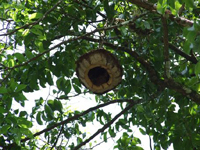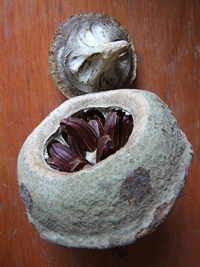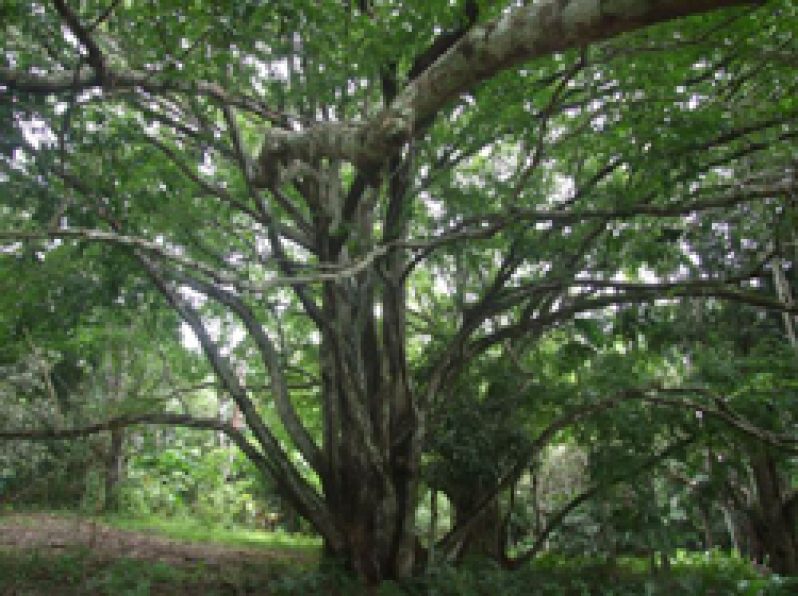THE Monkey Pot tree, the scientific name of which is Lecythis zabucajo, is one of a large number of lesser known exotic trees which grow in Guyana’s rainforests.
The Monkey Pot is a large-canopy nut-producing tree which grows up to over 100 feet tall. Its impressive, very symmetrical and umbrella-shaped canopy can be as much as 60 feet wide.
 The wood is used in construction, cabinetry, and the making of tool handles and other wooden items. The species is closely related to the Brazil Nut, which, like the Monkey Pot, belongs to the Lecythidaceae family, and bears coconut-sized fruits.
The wood is used in construction, cabinetry, and the making of tool handles and other wooden items. The species is closely related to the Brazil Nut, which, like the Monkey Pot, belongs to the Lecythidaceae family, and bears coconut-sized fruits.
The tree is common to the Guianas, as in Suriname, eastern Venezuela, Ecuador, Honduras and Brazil, but is less frequently found in central and western Amazonia.
Its fruit, as we said before, is coconut-sized, and roundish and woody, with a cap that pops off when it reaches maturity. Inside the fruit are anywhere from eight to 40 seeds, which eventually fall from the woody capsule after a period of time.
The nuts and their contents are highly nutritious, so that on maturing, they are soon seized upon by animals. The gourds, as the coconut-like fruits are called, have been used as water vessels, as well as for ornamental purposes, once the contents are removed. The tree took its name from an old proverb which goes thus: “A wise old monkey doesn’t stick its hand into a pot,” in obvious reference to the pot-like receptacles (fruit) that hold the seeds, and a monkeys’ eagerness to obtain them.
The tree took its name from an old proverb which goes thus: “A wise old monkey doesn’t stick its hand into a pot,” in obvious reference to the pot-like receptacles (fruit) that hold the seeds, and a monkeys’ eagerness to obtain them.
Apparently, young monkeys are in the habit of sticking their paws into an almost ripe fruit, and suffering the ignominy of not being able to extract them because they are filled with nuts, while the older ones would have learnt from experience that it was better to be patient and pull out the nuts one by one.
It was Jean-Baptiste Christophore Fusée Aublet, an 18th Century French botanist and explorer w (1720-1778), who first discovered the Lecythis zabucajo during his two-year sojourn in French Guiana, where he held the office of Apothecary Botanist.
During the period at reference, he gathered material for his book, Histoire des Plantes de la Guyane Françoise (The Plant History of French Guiana), which was published in 1775.
Due to ill health, however, Aublet’s stay in French Guiana was cut short, and, after an equally brief spell in Haiti, he returned to Paris in 1765.
To quote an excerpt from Hooker’s Journal of Botany (1849) on Monkey Pot: “The entire fruit in question is highly curious: It is six inches and more long, about four wide of a thick and woody texture opening at the top like a box with a transverse lid.
“The entire fruit in question is highly curious: It is six inches and more long, about four wide of a thick and woody texture opening at the top like a box with a transverse lid.
“From the upper side of this lid, a woody column descends to the bottom of the inside of the fruit, and around this column, the large seeds are arranged.
“This and others are called, in French Guiana, marmite (porringer) de singe, partly because the monkeys have the good taste to show a fondness for the kernels, and partly from the use made by the negroes of the emptied capsules (the lids being removed), wherewith to trap these wily animals.
“The mouth of the capsule, it will be observed, is narrower than the inside; this being filled with sugar, and laid in a place frequented by monkeys.
“The monkeys grasp the sugar, and by this means enlarge the paw so as to be unable to extricate it, while their greediness forbids the opening of the paw and loss of the sugar.
“The heavy fruit of L. zabucajo prevents the escape of the animal, who is pursued and taken into the monkey trap.”
The BARAMA Company Limited, which recently acquired Legal Origin international certification, has been commended for adopting the Guyana Forestry Commission’s thrust of harvesting and utilizing lesser known species of trees, including the Monkey Pot.












